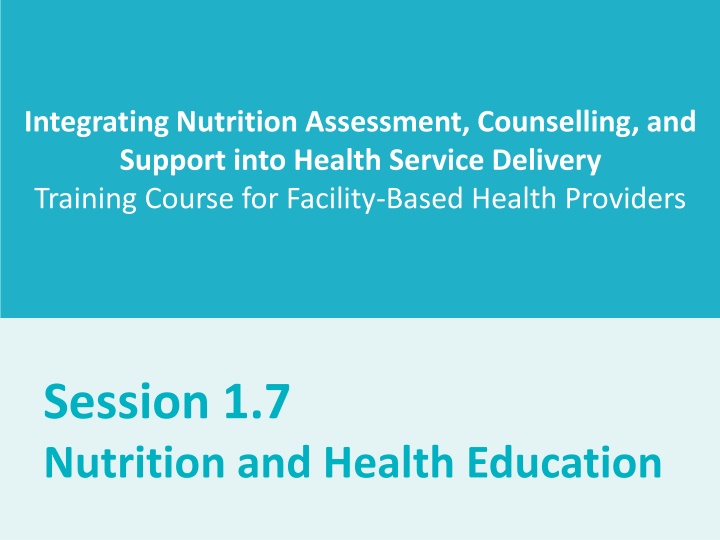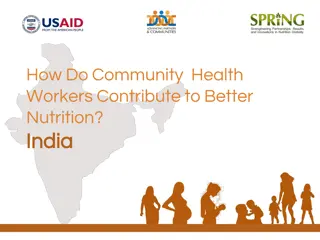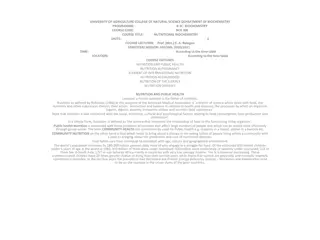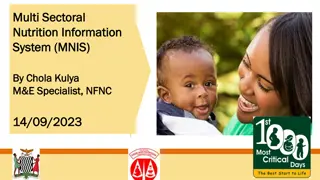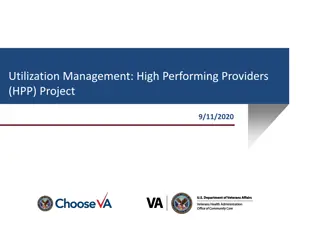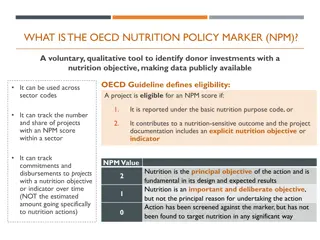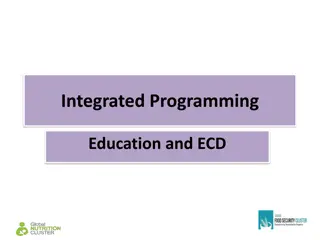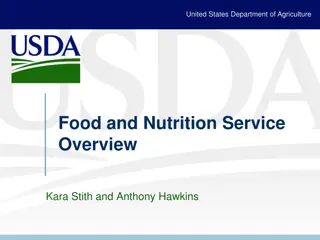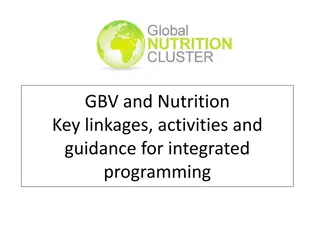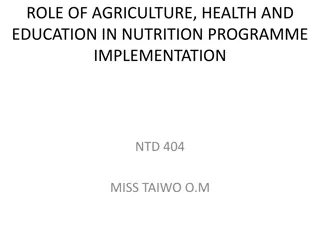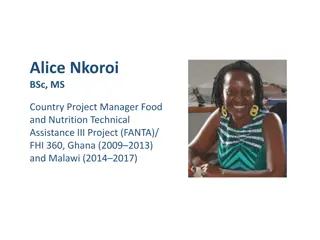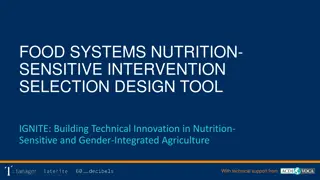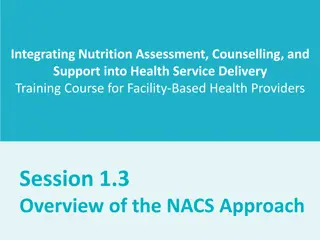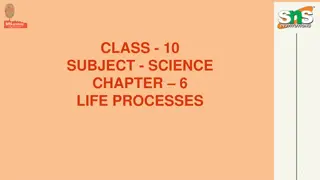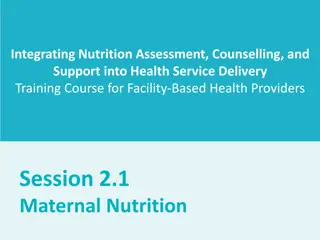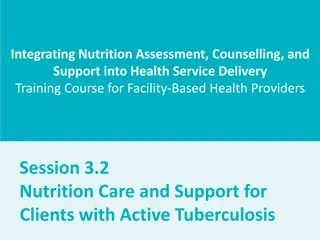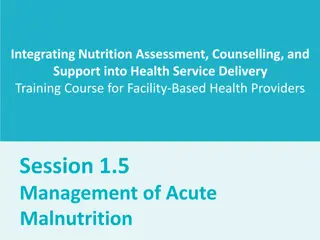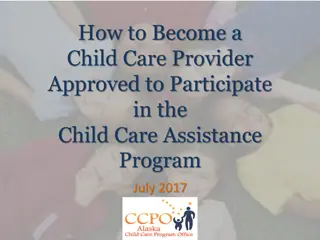Integrating Nutrition Assessment and Health Education for Health Providers
This training course aims to equip facility-based health providers with the necessary knowledge on nutrition and health education. Participants will learn about the benefits of effective education, different channels for providing education, qualities of successful talks, and steps for organizing such talks. The session emphasizes the importance of nutrition and health education in promoting community well-being and improving care-seeking practices.
Download Presentation

Please find below an Image/Link to download the presentation.
The content on the website is provided AS IS for your information and personal use only. It may not be sold, licensed, or shared on other websites without obtaining consent from the author.If you encounter any issues during the download, it is possible that the publisher has removed the file from their server.
You are allowed to download the files provided on this website for personal or commercial use, subject to the condition that they are used lawfully. All files are the property of their respective owners.
The content on the website is provided AS IS for your information and personal use only. It may not be sold, licensed, or shared on other websites without obtaining consent from the author.
E N D
Presentation Transcript
Integrating Nutrition Assessment, Counselling, and Support into Health Service Delivery Training Course for Facility-Based Health Providers Session 1.7 Nutrition and Health Education
Session Objectives By the end of the session, participants will be able to: Define nutrition and health education Describe the benefits of effective nutrition and health education Describe channels for providing nutrition and health education to communities Describe the qualities of effective nutrition and health talks Identify steps for organizing and facilitating a nutrition and health talk Integrating Nutrition Assessment, Counselling, and Support into Health Service Delivery 2
Group Discussion What are nutrition and health education talks? Integrating Nutrition Assessment, Counselling, and Support into Health Service Delivery 3
Nutrition and Health Education A form of social and behaviour change communication Any combination of learning experiences designed to help individuals and communities improve their nutrition and/or health by increasing their knowledge or influencing their attitudes (adapted from WHO) The development of individual, group, institutional, community, and systemic strategies to improve knowledge, attitudes, skills, and behaviour that contribute to improved nutrition and/or health An interactive meeting in which a health worker or community volunteer talks with a group of individuals in a community on a topic relevant to the nutrition and health issues of that community Integrating Nutrition Assessment, Counselling, and Support into Health Service Delivery 4
Nutrition and Health Education: Benefits Increased awareness of services available at the facility and in the community Potential for dispelling rumours/myths Opportunity to learn about the needs and expectations of a community so they can be addressed Increased community ownership of programs and increased cooperation Stronger linkages between health facility and community, helping ensure continuum of care Improved care-seeking practices Integrating Nutrition Assessment, Counselling, and Support into Health Service Delivery 5
Group Discussion What are some ways that health education can be provided? Integrating Nutrition Assessment, Counselling, and Support into Health Service Delivery 6
Channels and Considerations Tailored communication Interactive Able to unpack complex information Builds behavioural skills Time and resource intensive Provides social support Inspires collective ownership of the problem Can motivate collective solutions Interpersonal: One-on-one meetings, counselling sessions, peer-to-peer exchanges, small group trainings, etc. Community-Based: Community meetings and events, community drama, etc. Extensive reach Efficient and consistent repetition of messages Mass Media: Radio and TV ads and programmes, newspaper articles, posters, brochures, billboards, etc. Adapted from C-Change 2012 Integrating Nutrition Assessment, Counselling, and Support into Health Service Delivery 7
Brainstorm: Qualities of Effective Nutrition and Health Education Talks What is the facilitator s role when giving a health talk? What are the qualities of a good health talk? What are the challenges to facilitating health talks well? How can these challenges be overcome? Integrating Nutrition Assessment, Counselling, and Support into Health Service Delivery 8
Organizing and Facilitating Effective Nutrition and Health Talks What do you do to prepare for nutrition and health talks? Integrating Nutrition Assessment, Counselling, and Support into Health Service Delivery 9
Organizing and Facilitating Effective Talks Before the talk: Identify the target group and one or two specific, relevant topics. Determine the best approach for the target audiences to learn and participate. Determine key messages the audience should learn from the talk. Make objectives for the session, based on what participants need to know. Identify some of the common barriers to and facilitators of healthy practices. Integrating Nutrition Assessment, Counselling, and Support into Health Service Delivery 10
Organizing and Facilitating Effective Talks Before the talk: Review information on the topic so that it is familiar, and make sure it is up to date. Prepare the materials you will need to conduct the session (e.g., handouts, flyers, counselling cards, flip charts, demonstration foods). Prepare brief prompting notes for yourself. Inform the participants about the date, time, venue, and topic of discussion. Get to the venue at least 30 minutes before the talk to make sure the venue is in order and set up your materials. Note: It may be helpful to prepare a simple chart that lists target group, objectives, key messages, strategy, and/or materials. Integrating Nutrition Assessment, Counselling, and Support into Health Service Delivery 11
Organizing and Facilitating Effective Talks During the talk: Create rapport with the group. Encourage discussion and participation. Keep the discussion focused on the topic. Ensure that participants understand key points. Integrating Nutrition Assessment, Counselling, and Support into Health Service Delivery 12
Organizing and Facilitating Effective Talks After the talk: Ask whether the participants felt the session was helpful and how they might use what they learned. Write a report about the activity (attendance, feedback from the group). Do a self-evaluation (or ask a colleague to provide feedback using Handout 1.7.1 Health Talk Observation Checklist) to identify what you did well and what needs improvement. Integrating Nutrition Assessment, Counselling, and Support into Health Service Delivery 13
Group Work: Case Scenario You need to hold a nutrition and health education talk in Kingingo, a village that is 25 km from your health facility in Nakasongola district, to discuss the advantages of proper nutrition for PLHIV. The audience mainly will be busy farmers, who would really appreciate a talk that is specific, concrete, and fun. What steps will you take before, during, and after the talk? Integrating Nutrition Assessment, Counselling, and Support into Health Service Delivery 14
Thank you! Questions, additions, and clarifications? Integrating Nutrition Assessment, Counselling, and Support into Health Service Delivery 15
